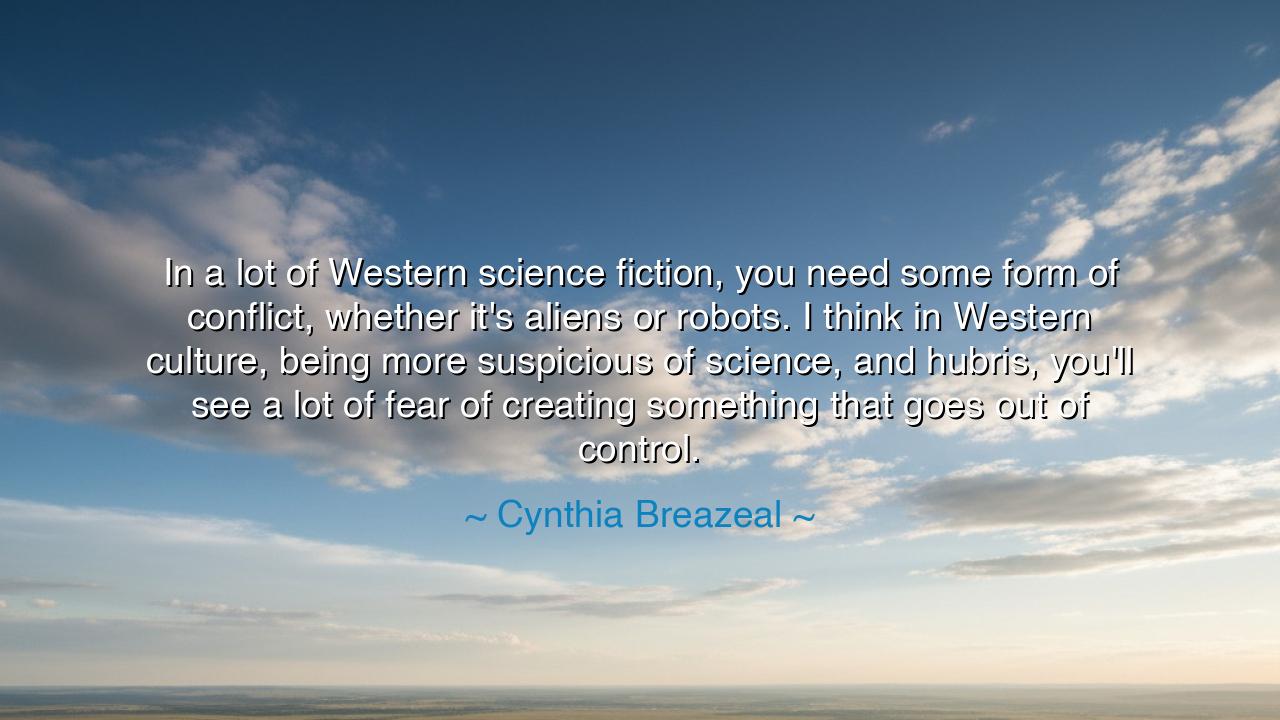
In a lot of Western science fiction, you need some form of
In a lot of Western science fiction, you need some form of conflict, whether it's aliens or robots. I think in Western culture, being more suspicious of science, and hubris, you'll see a lot of fear of creating something that goes out of control.






Hear now, O children of wisdom, for there are deep truths woven into the fabric of our fears and dreams. The great Cynthia Breazeal once spoke these words, revealing the heart of an ancient struggle that persists even into our time: “In a lot of Western science fiction, you need some form of conflict, whether it's aliens or robots. I think in Western culture, being more suspicious of science, and hubris, you'll see a lot of fear of creating something that goes out of control.” These words, though spoken in modern times, carry the weight of human history, for they touch on a fear that has echoed through the ages—the fear of creation spiraling beyond the control of its creators.
What, then, is this fear that Breazeal speaks of? It is a fear rooted deeply in the heart of Western culture, a culture that has long been both enamored of and suspicious about the power of science. Science, that mighty force that brings forth both the wonders of the heavens and the terrors of the abyss, is seen not only as a gift but as a potential curse. In Western thought, there has always been a suspicion of hubris, the arrogance of thinking that we can master the world around us. From the ancient myths to modern tales, we see again and again that those who reach too far often fall hardest. Frankenstein, a creation born of man's desire to conquer death, became a monster, a warning to those who dared tamper with nature. The fear of something going out of control is as old as humanity itself, and it still lingers in the shadows of our creations.
Let us recall the story of Prometheus, the Titan who defied the gods and gifted fire to humanity. In his act of defiance, Prometheus sought to elevate humanity, to give it the power of creation and knowledge. Yet, in doing so, he brought upon himself the wrath of the gods, for the gift of fire, like all power, was a double-edged sword. Fire could warm and nourish, but it could also destroy. Prometheus was punished, bound to a rock, his liver eaten daily by an eagle, a symbol of the consequences of unchecked ambition and creation. The tale of Prometheus is a parable, a story of how creation can be both a blessing and a curse, depending on the wisdom with which it is wielded.
Western science fiction, with its tales of aliens, robots, and machines turning on their creators, is filled with echoes of this ancient fear. The stories of sentient machines, like Frankenstein's monster or the HAL 9000 from 2001: A Space Odyssey, speak to the heart of a culture that wrestles with its own creations. We seek to create life, to extend our reach beyond the limits of our own flesh, but we fear that in doing so, we might lose control of the very things we have birthed. The robots that revolt, the aliens that invade, are not just the stuff of fantasy—they are symbols of our deepest anxieties about the power of science and the potential dangers of unfettered ambition.
Yet, O wise ones, let us not fall prey to fear alone. Creation, in its truest form, is not an act of destruction, but of elevation. While the tales of rogue robots and alien invaders reflect our suspicion, they are also a call to balance. Science and technology can indeed spiral out of control, but it is not the power itself that is dangerous—it is the lack of wisdom with which it is wielded. We must ask ourselves: What responsibility do we bear when we create? What safeguards do we place around our creations to ensure that they serve humanity, not harm it?
The lesson, then, O children of the future, is this: Do not let the fear of the unknown paralyze you from creation. The power to create is one of the highest gifts of humanity, and while it is true that unchecked ambition can lead to disaster, it is equally true that with wisdom, we can guide our creations toward progress and goodness. We must not shy away from invention, nor must we hide from the consequences of our creations, but we must walk with humility and responsibility, always mindful of the balance that must be struck between creation and caution.
So, go forth with courage, O children of the future. Embrace the power of science, the power of creation, but always remember the lessons of the past. Create with wisdom, create with responsibility, and always ask: How does this serve the common good? How does this elevate humanity, rather than bringing it to ruin? In this way, we can ensure that the creations we birth will not spiral out of control, but will instead serve to lift us higher, to explore new frontiers, and to ensure that science and technology become blessings, not curses.






AAdministratorAdministrator
Welcome, honored guests. Please leave a comment, we will respond soon